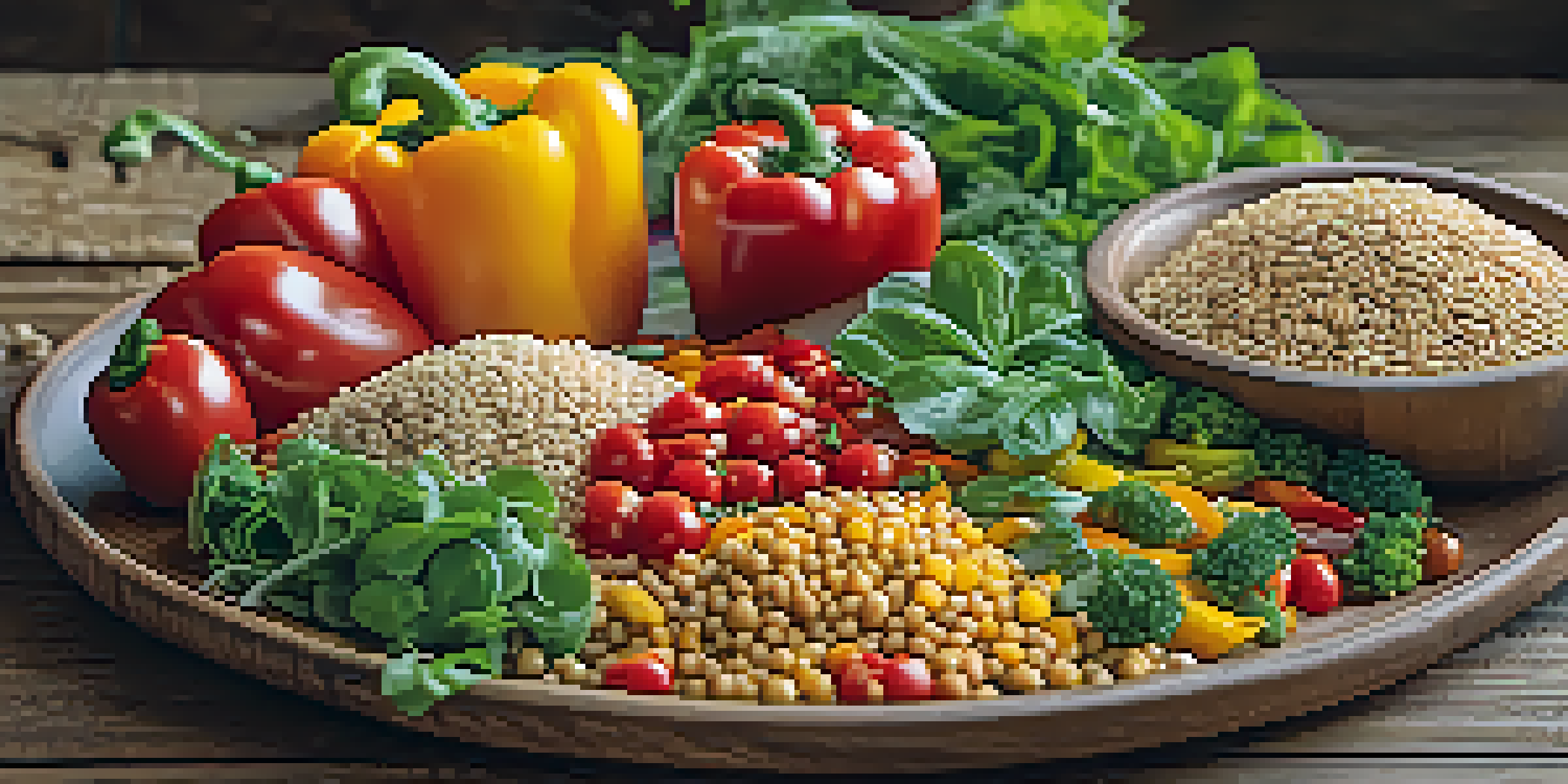Exploring Plant-based Diets: Nutritional Science Fundamentals

Understanding Plant-based Diets: The Basics
A plant-based diet primarily focuses on foods derived from plants, including fruits, vegetables, nuts, seeds, oils, whole grains, legumes, and beans. Unlike vegetarianism, which excludes meat, a plant-based diet can encompass varying levels of animal products. This dietary approach emphasizes whole, minimally processed foods and encourages reducing animal products for health and environmental reasons.
Let food be thy medicine and medicine be thy food.
For many, transitioning to a plant-based diet can seem daunting. However, it can also be a delicious and rewarding journey. Think of it as exploring new culinary landscapes, where vibrant vegetables and wholesome grains become the stars of your meals rather than mere side dishes.
The beauty of a plant-based diet lies in its flexibility. You don’t have to go all-in overnight; instead, you can gradually incorporate more plant foods into your meals. This gradual shift not only allows your palate to adjust but also makes the journey sustainable in the long run.
Key Nutritional Components of Plant-based Diets
To thrive on a plant-based diet, it's essential to understand its key nutritional components. These include proteins, healthy fats, carbohydrates, vitamins, and minerals, all of which play a vital role in maintaining your overall health. For instance, legumes and quinoa are excellent sources of protein, while nuts and avocados provide healthy fats.

Carbohydrates, often misunderstood, are vital for energy and can be sourced from whole grains like brown rice and oats. Meanwhile, fruits and vegetables are packed with essential vitamins and minerals, offering a wide range of health benefits. A colorful plate often translates to a nutrient-dense meal!
Plant-based Diet Basics Explained
A plant-based diet focuses on foods from plants while allowing varying levels of animal products, promoting health and environmental benefits.
Moreover, being mindful of nutrients like Vitamin B12 and iron is crucial, especially for those fully eliminating animal products. Fortified foods and supplements can help bridge any nutritional gaps, ensuring you receive a balanced diet while embracing plant-based eating.
Health Benefits of Adopting a Plant-based Diet
Research has shown that adopting a plant-based diet can lead to numerous health benefits. For instance, studies suggest that it can lower the risk of chronic diseases such as heart disease, diabetes, and certain cancers. This dietary approach is often rich in fiber, which aids digestion and can help maintain a healthy weight.
Eating plants is not just about our health, but about the health of our planet.
In addition, many people report increased energy levels and improved mood when they shift to a plant-based diet. This might be due to the abundance of antioxidants found in fruits and vegetables, which combat inflammation and support overall well-being. It's like fueling your body with premium-grade fuel!
However, it's important to note that not all plant-based foods are created equal. Highly processed options can still be part of a plant-based diet but may not offer the same health benefits as whole foods. Striving for balance and variety is key to reaping the full rewards of this dietary lifestyle.
Common Myths About Plant-based Diets Debunked
Despite the growing popularity of plant-based diets, several myths persist that can deter people from trying it. One common misconception is that you can't get enough protein without meat. In reality, there are plenty of plant sources, such as lentils, chickpeas, and tofu, that pack a protein punch.
Another myth is that plant-based diets are too expensive. While organic and specialty products can be pricey, staples like beans, rice, and seasonal produce are often budget-friendly. Shopping at local markets and buying in bulk can also help you save money while enjoying a variety of plant foods.
Health Benefits of Plant-based Eating
Adopting a plant-based diet can lower the risk of chronic diseases and improve overall well-being through increased fiber and antioxidants.
Lastly, some believe that a plant-based diet lacks flavor or variety. However, with a little creativity and exploration, plant-based meals can be incredibly diverse and satisfying. From spicy curries to refreshing salads, the culinary possibilities are endless!
Tips for Transitioning to a Plant-based Diet
Transitioning to a plant-based diet doesn't have to be overwhelming. Start by setting realistic goals, such as 'Meatless Mondays' or incorporating a new vegetable into your meals each week. Gradually replacing animal products with plant-based alternatives makes the process manageable and enjoyable.
Experimenting with recipes can also make your transition smoother. Dive into cookbooks or online resources that focus on plant-based cuisine, and don't be afraid to get creative in the kitchen! You might discover new favorite dishes that you never thought you would love.
Lastly, find a supportive community, whether it's friends, family, or online groups. Sharing your journey with others can inspire and motivate you to stick with your new dietary choices, making the transition not just easier but also more fun!
Practical Meal Planning for Plant-based Diets
Meal planning can be a game-changer for anyone adopting a plant-based diet. By dedicating some time each week to plan your meals, you can save time, reduce food waste, and ensure you have balanced options on hand. Start by selecting a few recipes that excite you and create a shopping list based on those meals.
Batch cooking is another effective strategy, allowing you to prepare larger portions of staples like grains and legumes. This not only makes weeknight dinners a breeze but also gives you ready-to-go meals for busy days. Think of it as setting yourself up for success!
Tips for Smooth Transitioning
Setting realistic goals and finding supportive communities can make transitioning to a plant-based diet manageable and enjoyable.
Lastly, keep your pantry stocked with essentials like canned beans, frozen vegetables, and whole grains. Having these items on hand can make whipping up a healthy meal in a pinch much easier. With a little planning, a plant-based diet can be both convenient and enjoyable!
Getting Support: Resources for Plant-based Eating
Navigating a new dietary lifestyle can be challenging, but numerous resources are available to help you along the way. Online communities, social media groups, and forums can provide support and inspiration, connecting you with like-minded individuals who share your journey.
Books and documentaries focused on plant-based eating can also be enlightening. They often provide insights into the health benefits, environmental impacts, and ethical considerations surrounding food choices. These resources can empower you to make informed decisions about your diet.

Lastly, consider consulting a registered dietitian or nutritionist who specializes in plant-based diets. They can help tailor a plan that meets your nutritional needs and aligns with your lifestyle, ensuring you embark on this journey with confidence.